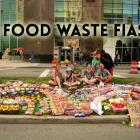You are here
» » Reducing Your “Foodprint”
Reducing Your “Foodprint”
Food is probably the most carbon intensive of our basic needs. Consider the time and care required to grow food in our gardens and on our farms, that nourish us as humans.
Now add in all of the indirect processes from farm to table: crops diverted to feed the animals we eat, fossil fuel inputs such as fertilizers and transportation, food packaging, deforestation, cow farts... finally, consider globalization’s impact - today’s industrial food complex is now making available endless varieties of food from all corners of the globe, satisfying our never ending appetite for non-local, out-of-season exotic fruits and vegetables.
It’s no wonder that “the entire food industry is responsible for one third of all human caused greenhouse gas emissions” according to nature.com [1]. The same article propounds that, ironically, by 2050 global warming could cause crop reductions of 13% in wheat and 15% in irrigated rice in developing countries.
Our day-to-day decisions revolving around what we eat and where we buy it have a large impact on our carbon footprint. These decisions also have far reaching impacts on our health, the well being of farmers, and the environment, from our forests to our water systems, across the globe.
Read more

